Andreas Engman
x
mail: andreas.engman@agitera.com
cell: +46(0)704155739
Studio / Public platform: Harald Stakegatan 2, 415 15 GBG
I'm an artist, educator, and former chef living and working in Gothenburg. My artistic practice is rooted in a conceptual and research-driven methodology. A long-standing interest in my work is investigating the many productive entanglements formed in the intersection of institutional critique, political philosophy, politics of food, and performance practices. My works are associative, open-ended assemblages that often meet the public through installations, performances, and soundscapes. I frequently seek counter-rational strategies and speculative forms of meaning-making when producing work. I'm interested in how metaphor can open up speculative reframings and new interpretations of a specific subject. And how to practice methods of cross-pollination to try to see things in a new light by borrowing the specificities from one field of study to contaminate old customs in the crossover between subjects and new ways of knowing. My experience as a professional chef offers material knowledge and practical skills to my work on food and commensality.
Further investigations into the many political, aesthetic, and affective intersections of art and food are performed through the collaborative platform AFTERWORKS, which is run together with artists Rose Brander and Kjell Caminha.
Continuing my deep interest in the fabric of institutions through their structures, attitudes, and ecologies, I initiated the artist-run platform Temporary Stabilisations with artist Annie Johansson. Temporary Stabilisations can be seen as another vehicle and strategy to explore expanded practices tied to "the institutional." This project aims to establish a space to gain further insights into the complex ecologies of institutions. The space is a studio and a public transdisciplinary platform for contemporary art and related practices, situated in a former convenience store in Gamlestan in Gothenburg, Sweden.
In collaboration with Kjell Caminha, MC Coble, and Jeuno Kim, I also formed the group Public* Display* of Actions*. P*D*A* is an anti-fascist platform using performance and speech tactics from street and guerilla theater, agitprop, Speakers' Corners, and political assemblies to initiate contexts for collective experience, demonstration, and dialogue insisting on vigilance and direct process as a dramaturgical method and approach. How can the visual and performative literacy of art be shared and used collectively among artists, activists, researchers, and the general public to navigate the swiftly changing social and political climate in a time when white power and institutional violence are gathering in the wake of political instability driven by post-factual politics, white fragility, and entitlement?
︎
1 Index:
Selected Works
(scroll page or click in menue for specific works)
Current & Upcoming:
Selected Works
(scroll page or click in menue for specific works)
Current & Upcoming:
* The Omnivore’s Paradox: Critical Mouthfeel of Institutions
* Corpus Politicum: A Lively Vessel
* A Sour Place: Embodied Metabolisms and Fermented Narratives
* Recovery Drink!
* Undrar om hästar sjunger blues * Huvudgata, park, träd och sten:
En meditation över Västlänken och station Haga genom ljud, text, performance och objekt
* Who Gets In? Rethinking Admissons – Confronting Segregation * Radical Empathy: A Continuous Score, Act 12: The Pentathlon
* Utgrävningar: Småland - Kansas och tillbaks igen
* Temporary Stabilisations
* Radical Empathy: A Continuous Score, Act 11: The Musical
* Radical Empathy: A Continuous Score, Acts 7-10: The Mixtapes
* Dance Armstrong and the Log Sessions
* Eating Venice: Lagoon Legumes, Ceremony & Heritage
* Dicks Revisited
* Radical Empathy: A Continuous Score, Acts 4-6: Remix
* The Institute for Potentiality & Actualization: “Taxidermy of Speculative Gestures – a 21-day Conference”
* Let’s Mobilize! What is Feminist pedagogy?
* A Stockholm Syndrome * Assemblage: Dicks Revisited
* A Line Made by Swimming
* Between Symbolic Acts, Environmental Qualities & Human Sensibilities
~
Upcoming: 11-month residency @ Jan van Eyck, Post-Academy for Art, Design and Reflection, 15 January - 15 December 2026Recently:
The Omnivore’s Paradox:
Critical Mouthfeel of Institutions performance @ Skogen, 21 & 22 November 2025
Eating at The Noseless Dog Café workshop @ LjurhallaFabriken, 19 October
Semi-foraged rocket stove cooked vegan lunch for, Stewardship and Structures: Enacting, Regenerating and Maintaining
, with Sean Roy Parker and Eva Rowson @ LjurhallaFabriken. As part of the study circle Close Attention facilitaded by Rose Brander (PARSE). 23 September
Group exhibition @ KC Väst, 16th August - 21st September
The Noseless Dog Café Installation, food and hospitality for LjurhallaFabriken x NSFW Sommarsalong. July 5th @ LjurhallaFabriken
Residency @ Ljurhalla Fabriken, June 2025
The Omnivore’s Paradox:
Critical Mouthfeel of Institutions
Performed at SKOGEN 2025Duration: 3 hours
Performance, Installation, Costume & Sound: Andreas Engman
/ Light Design: Fabian Roos & Johan Almström / Photography: Hendrik Zeitler
The Omnivore’s Paradox: Critical Mouthfeel of Institutions, is a performative and metaphorical exploration of the paradoxical nature of eating. The work is presented as a three-hour ongoing performance installation where the audience can come and go as they please throughout the evening.
”The omnivore is inclined towards diversification, innovation, exploration and change, which can be vital to its survival; but on the other hand it has to be careful, mistrustful, ”conservative” in its eating: any new, unknown food is a potential danger. The omnivore’s paradox lies in the tension, the oscillation between the two poles of neophobia (prudence, fear of the unknown, resistance to change) and neophilia (the tendency to explore, the need for change, novelty, variety). Every omnivore, and man in particular, is subject to a kind of Batesonian double bind between the familiar and the unknown, monotony and change, security and variety. There is perhaps a fundamental anxiety in man’s relationship to foods, resulting not only from the need to distrust new or unknown foods, but also and more importantly from the tension between the two contradictory and equally constraining imperatives of the omnivore’s paradox.”
Claude Fischler. ”Food, Self and Identity”. Social Science Information/sur les sciences sociales. (27. 275-292. 1988)
If we examine what it truly means to eat something, it is a profoundly radical act! We take an external object from the world and make it a part of ourselves. This act risks our entire existence. Items whose taste and mouthfeel can bring pleasure and well-being can also pose a threat to our lives, depending on what they are made of. These fundamental ideas about eating are presented in The Omnivore’s Paradox, in speculative relation to concepts such as liminal spaces, the Eucharist rite, the institution as a body, and anxiety-inducing threshold states. All of these concepts are interconnected in one way or another through the many paradoxical practices of eating.
You can listen to the sound work HERE!
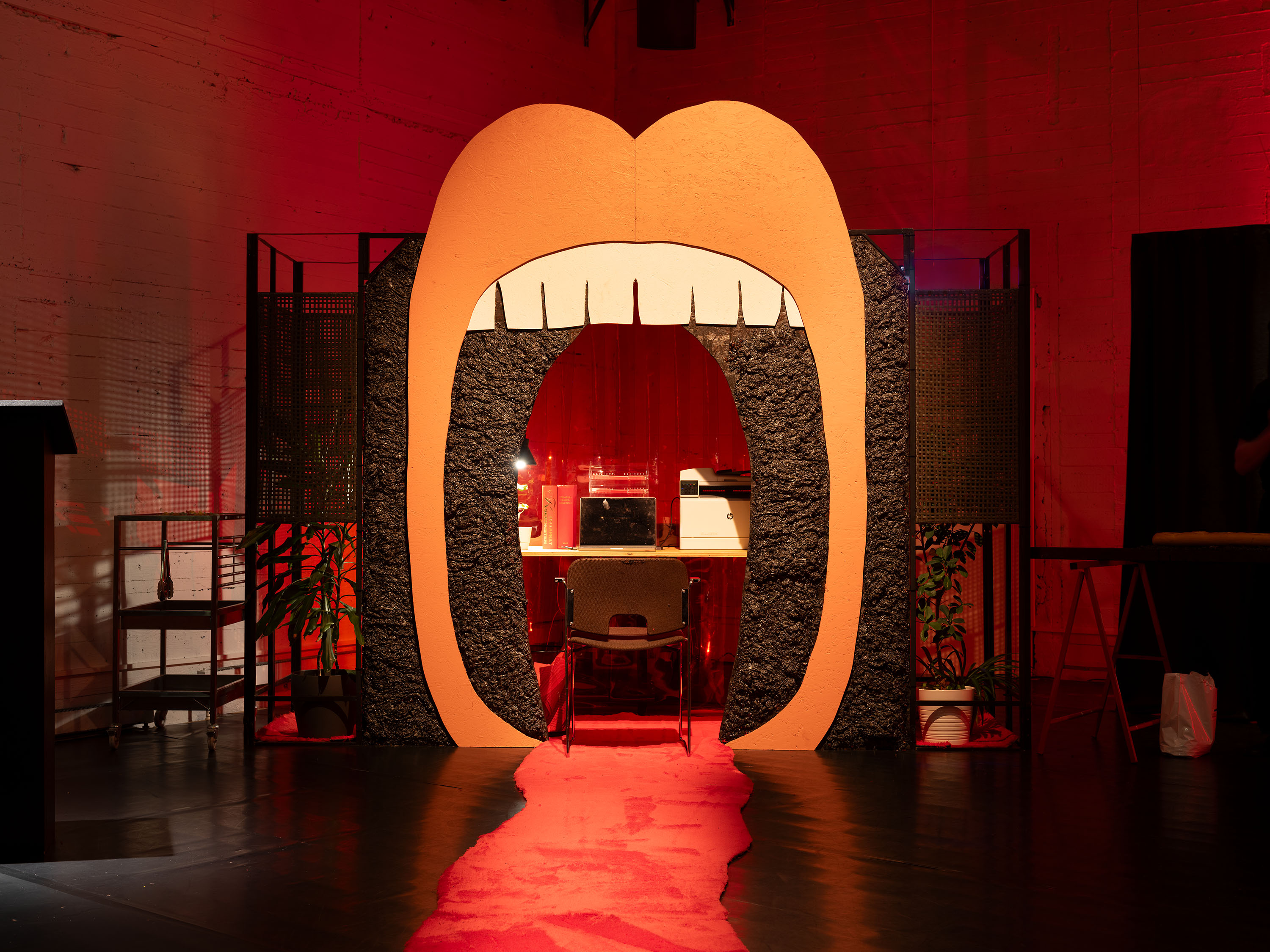


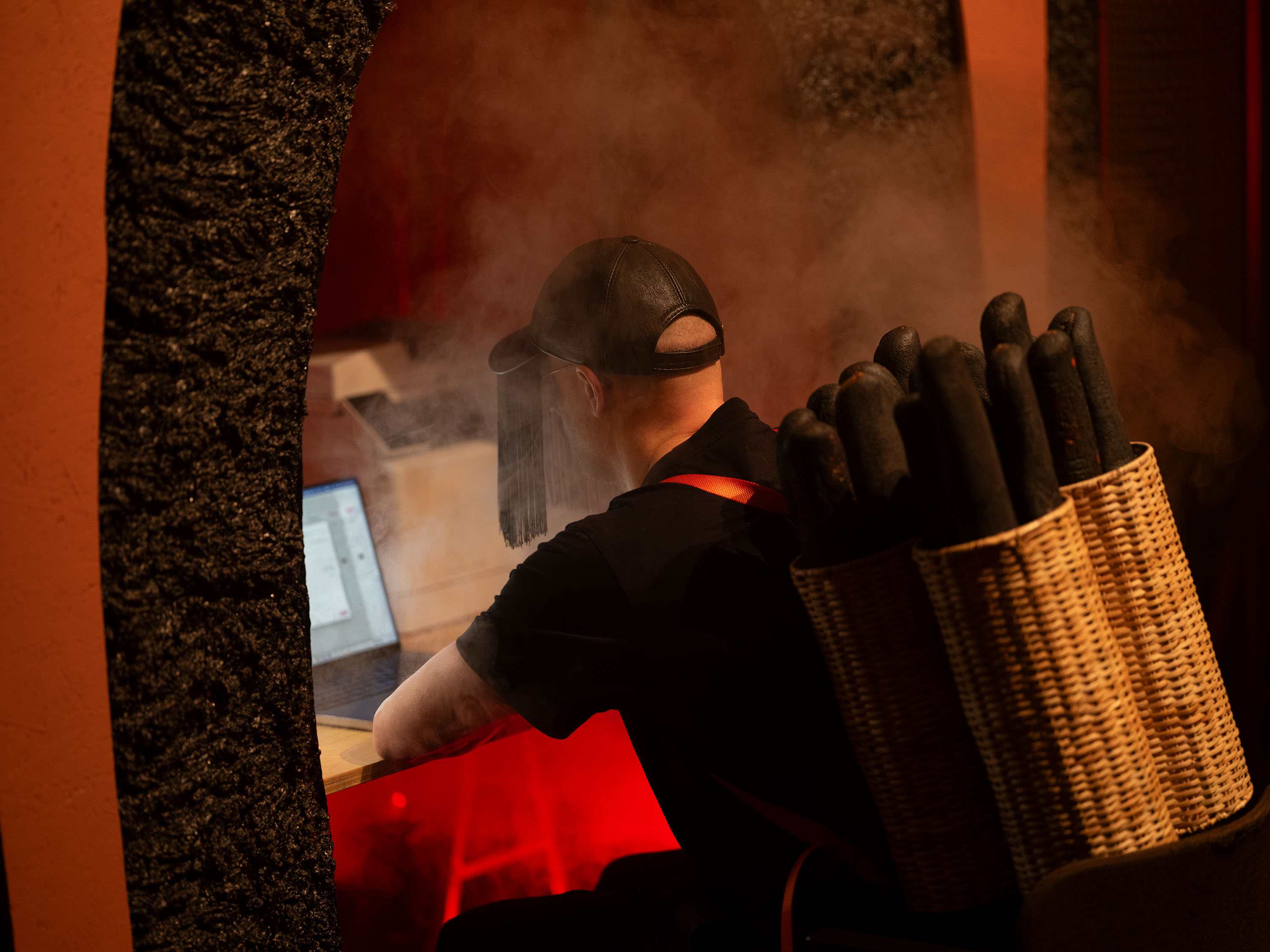
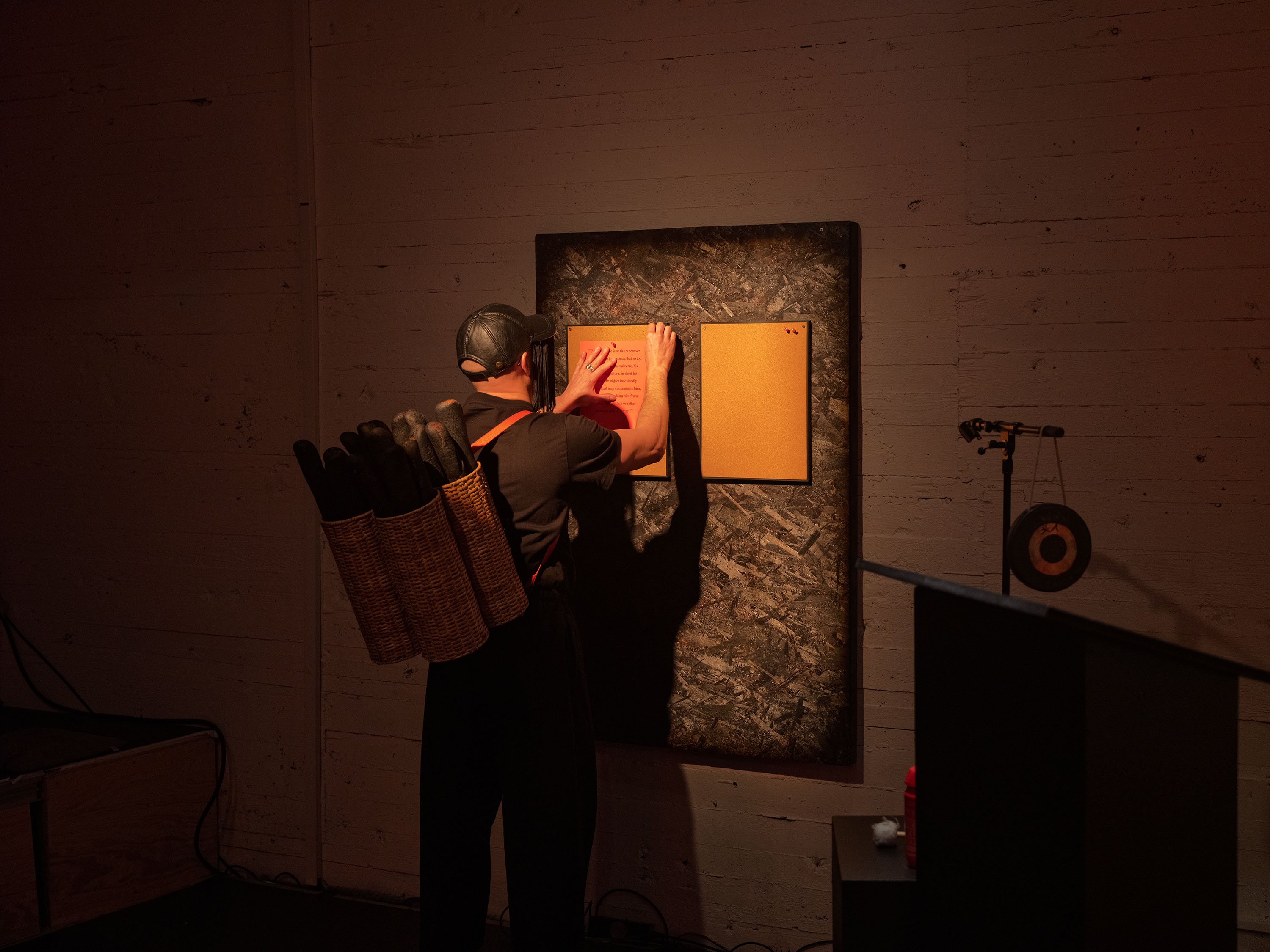

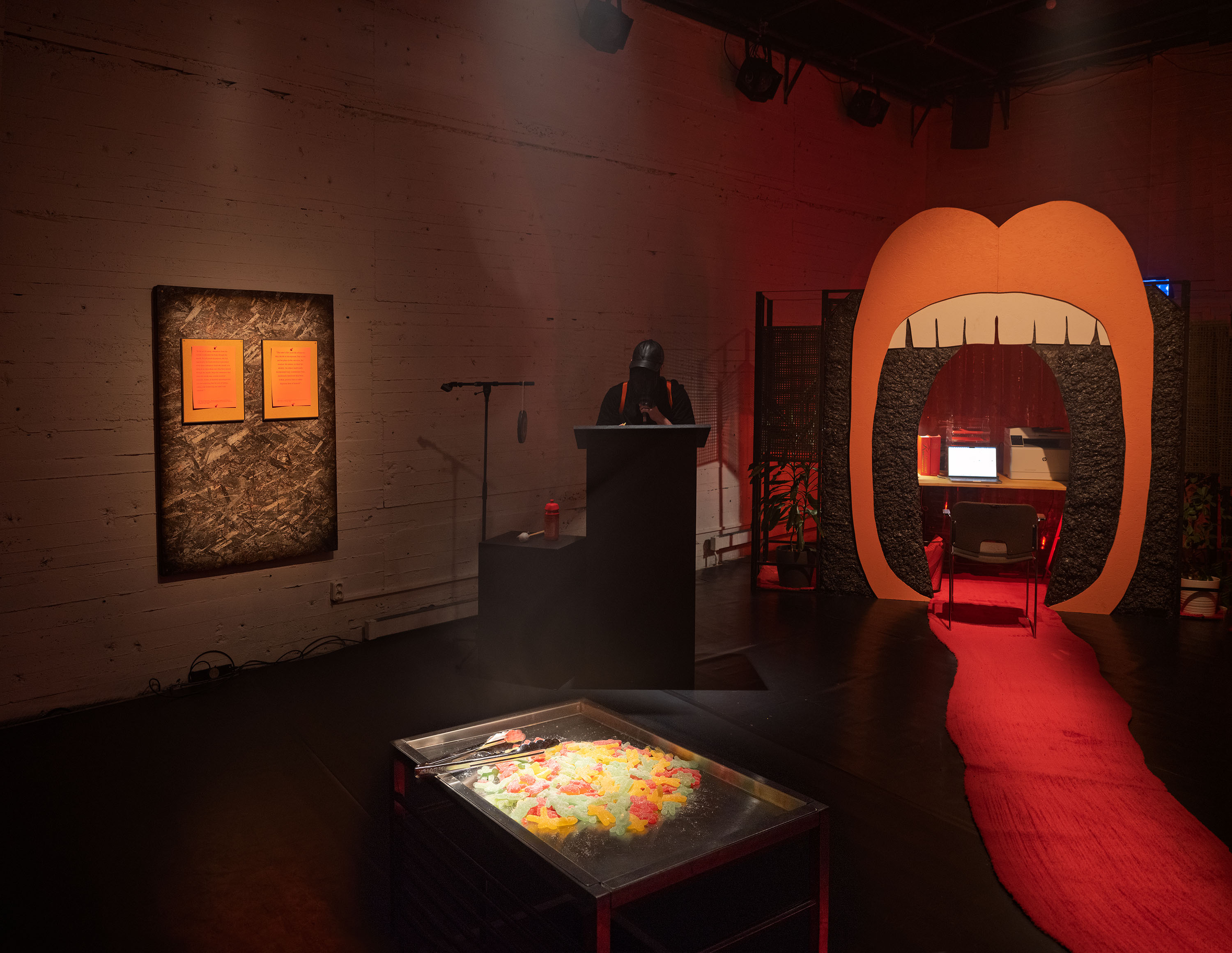
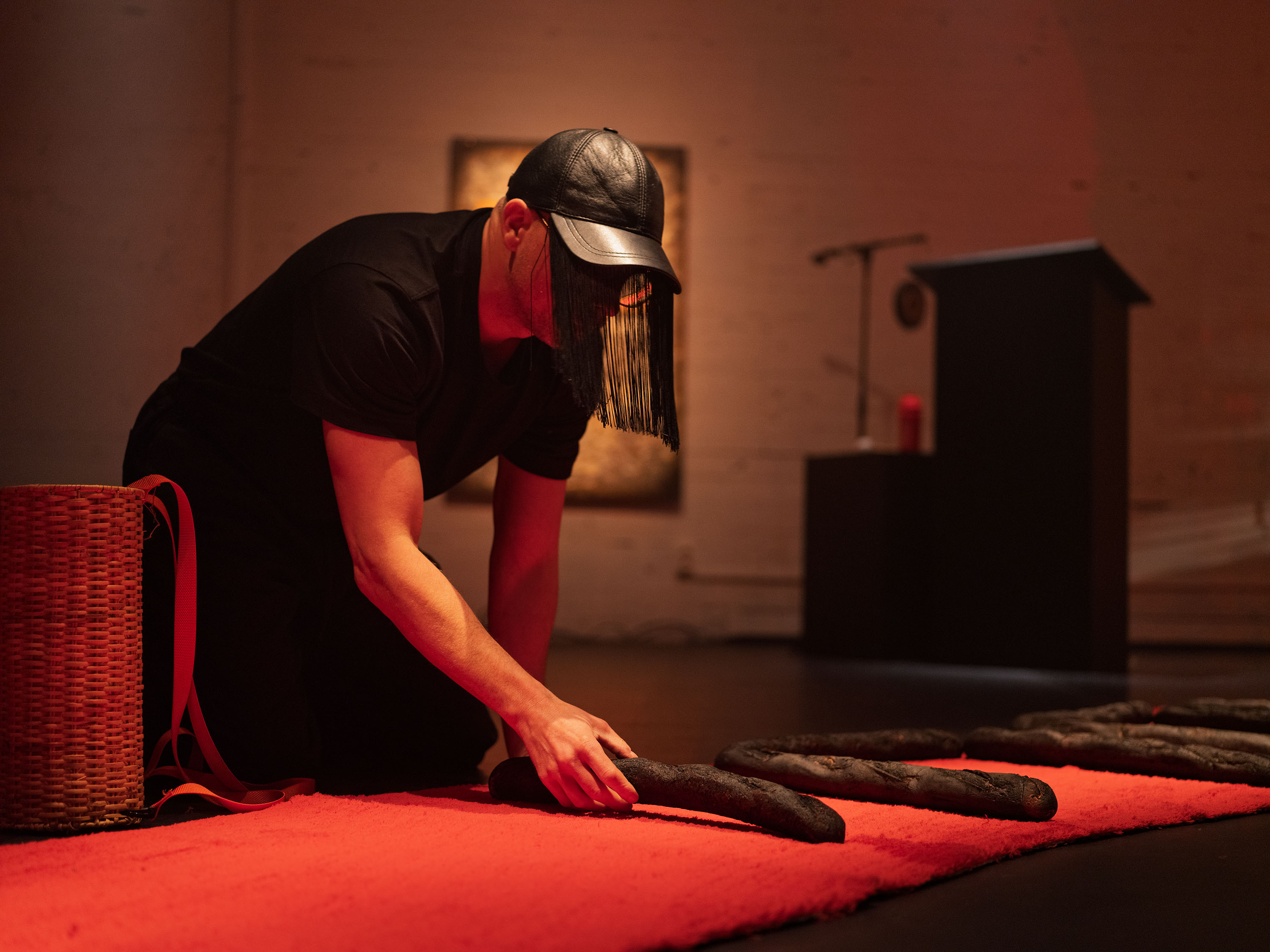

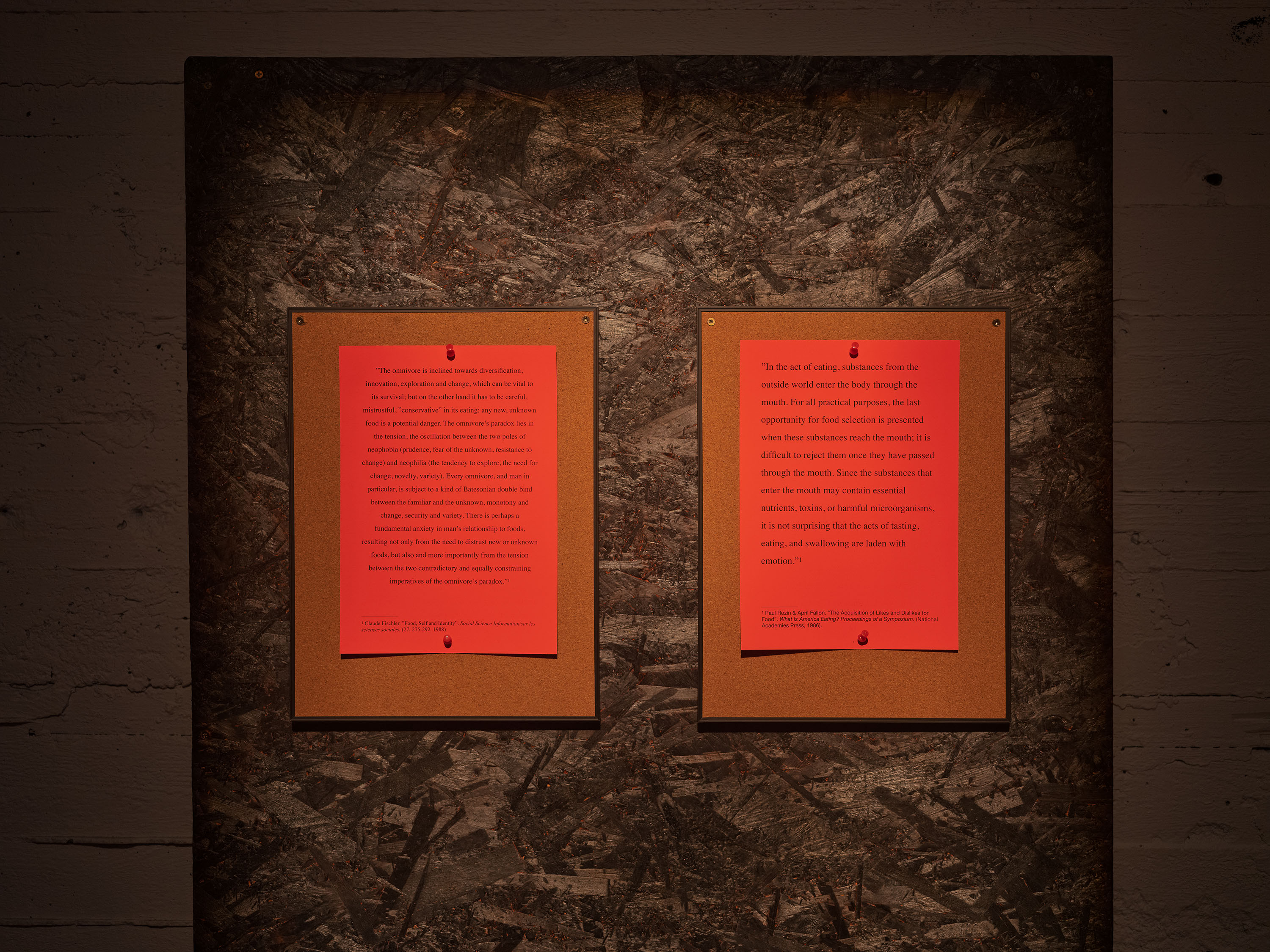

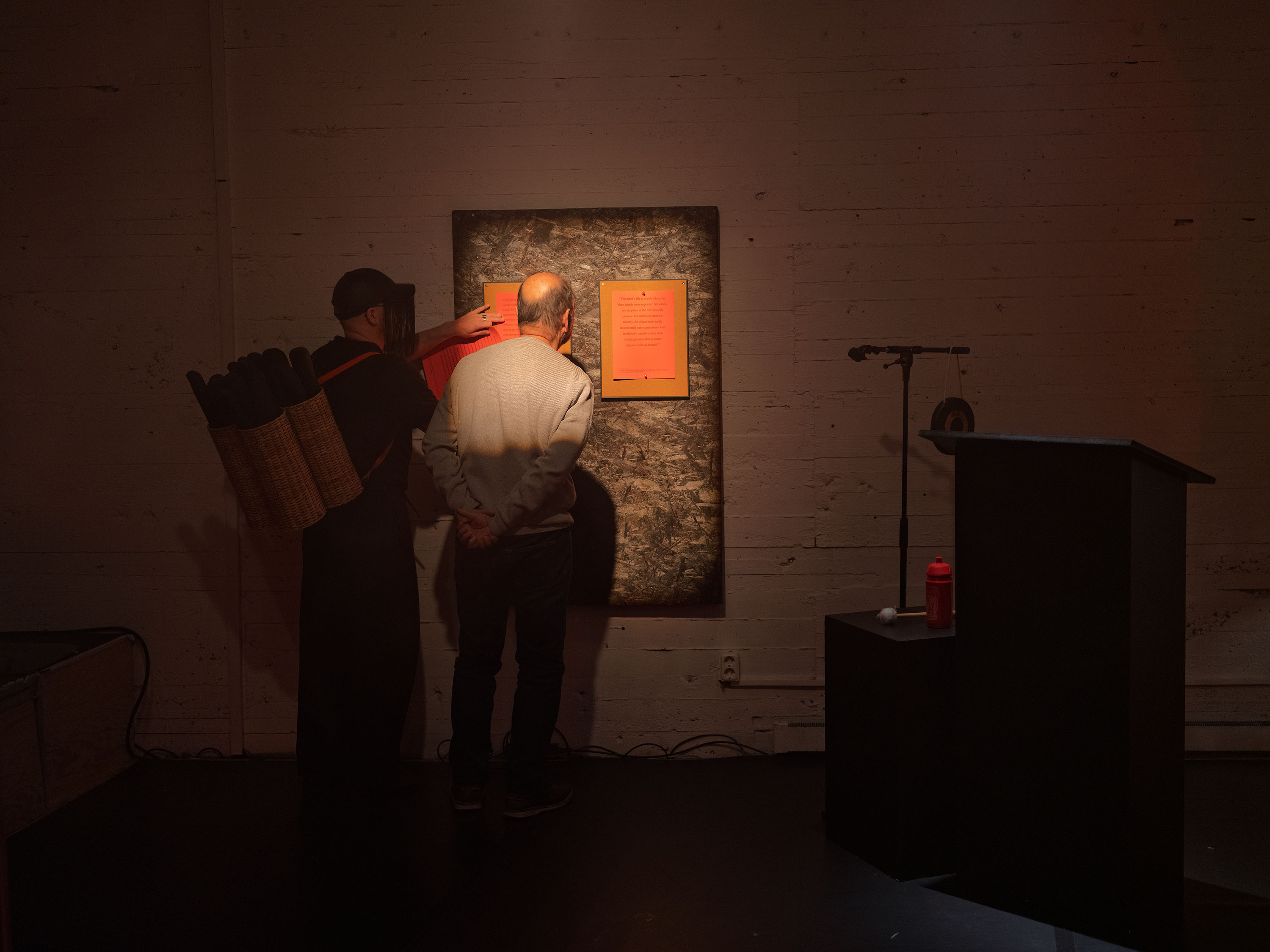

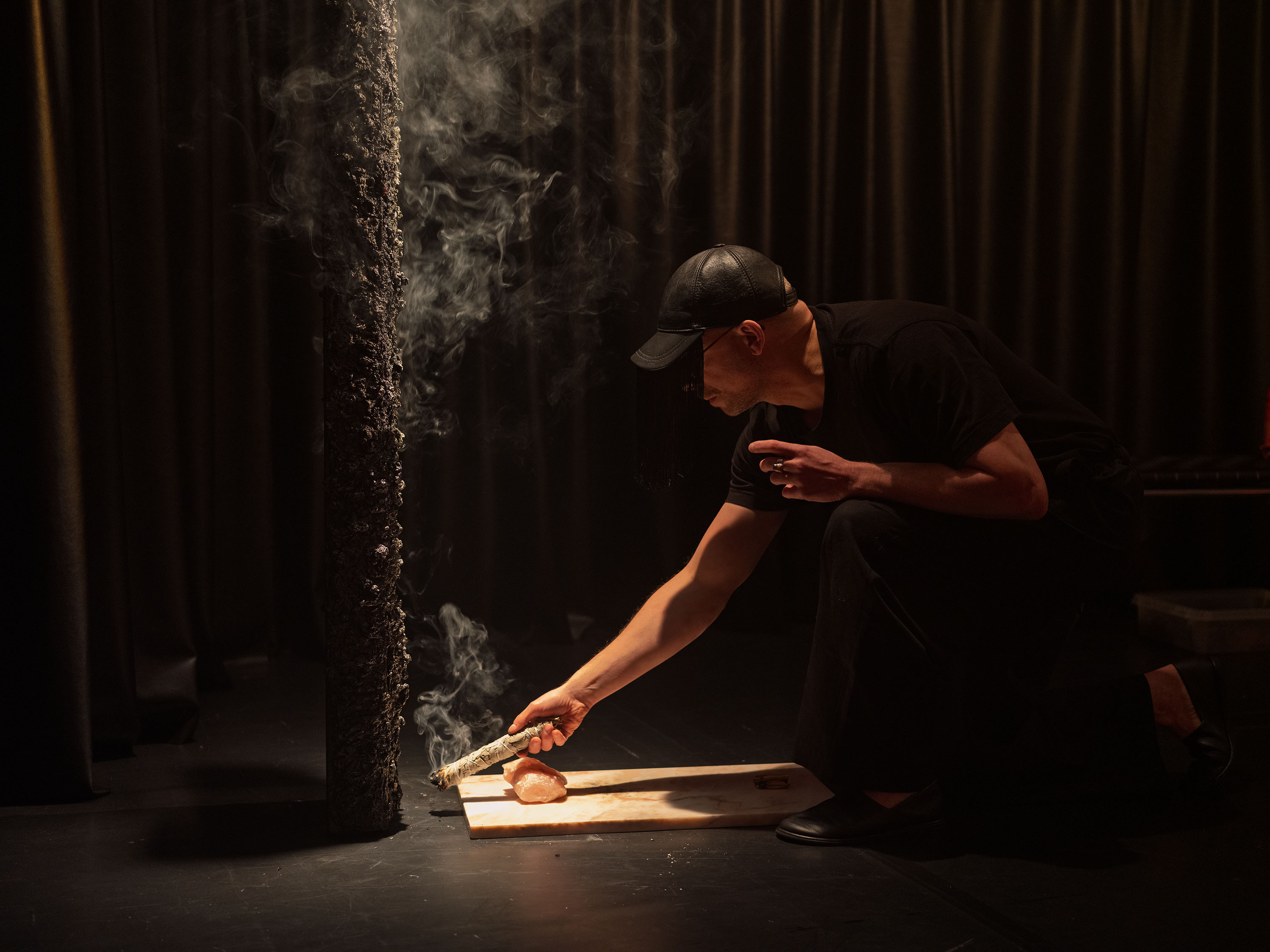
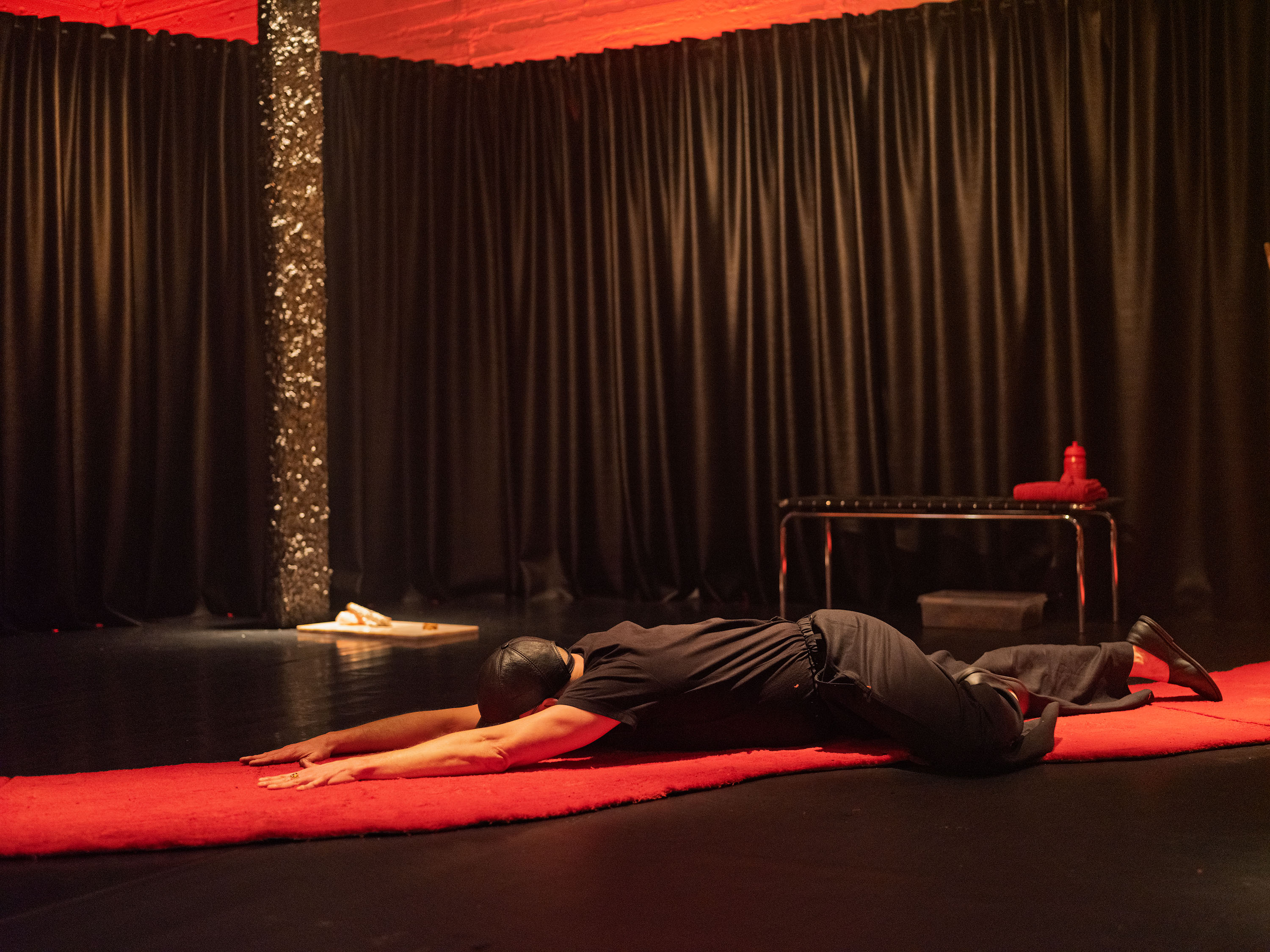
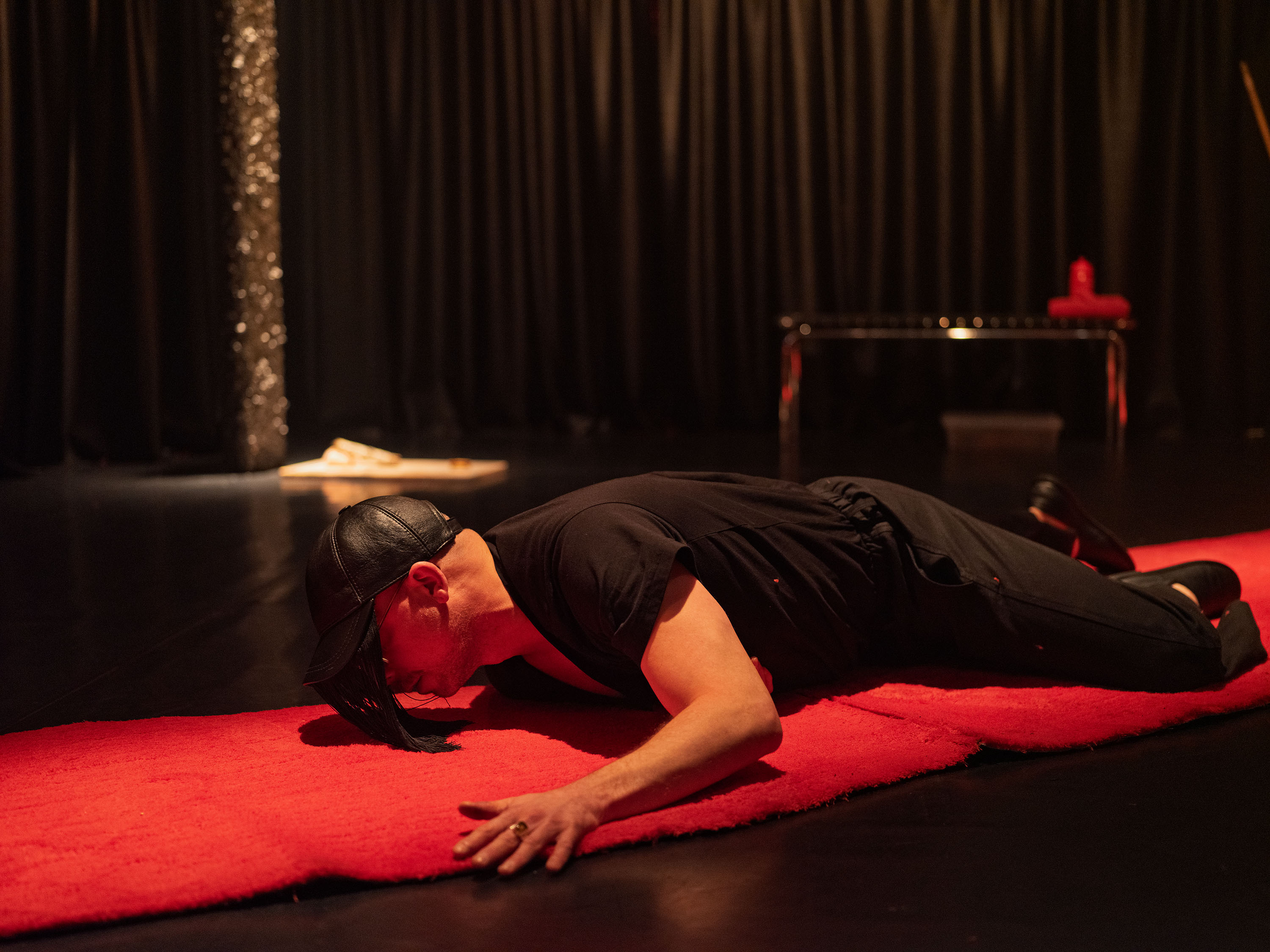


Corpus Politicum:
A Lively Vessel
Performed as part of Durational Space #5
at LILITH PERFORMANCE STUDIO, 2024
Duration: 3 hours
Performance: Andreas Engman / Recovery Drink: Andreas Engman / Sound: Andreas Engman / Costume: Annie Johansson / Textile Sculpture: Annie Johansson & Andreas Engman / Installation: Andreas Engman, Petter Pettersson & Lo Pettersson-Lundgren / Light Design: Lo Pettersson-Lundgren & Andreas Engman / Photography: Petter Pettersson
(Access the sound work HERE!)
In this final act of three on lacto-fermentation, I gaze more toward the body than in previous installments. Performative and metaphorical aspects of lactic acid production are met in Corpus Politicum, The Body Politic, a direction in political philosophy where the body is used as a metaphor for the sovereign nation-state or other institutions in society (see social organism and social body). Further examples are when an organization such as the UN refers to its various decision-making bodies; about nations, one speaks of heads of state, and in ancient times, political crises were often equated with a biological disease. The 17th-century British philosopher Thomas Hobbes (1588-1679), in his book Leviathan or The Matter, Form, and Power of a Common-Wealth Ecclesiasticall and Civil (1651), describes parts of the state/body as follows; 'sovereignty is the soul, and magistrates are the body's the joints, reward and punishment, its nerves. Money is the blood providing nutrients from the plenty of nature.'
The Body Politic has long been one of the most widely used metaphors for states and institutions in political discourse. Although it is also commonly used today, many people problematize its historical and contemporary effects on how we view our environment and who and what populates it. Historically, a form of immunological discourse has shaped our view of society and who is described as pathogenic or apatogenic in the state-body relation, who or what is dangerous and who or what is beneficial. A form of antiseptic relationship to what is considered foreign under prevailing norms. Something that feels more relevant than ever in today's protectionist society. In her book, The Microbial State - Global Thriving and the Body Politic, Professor of Political Theory Stefanie R. Fishel argues that climate change, neoliberalism, mass migration, and other aspects of the late Anthropocene have increasingly highlighted the limitations of this metaphor. Just as the human body is not whole and separate from other bodies but is made up of microbes, bacteria, water, and radioactive isotopes - she argues that the body politic of the state exists in a dense entanglement with other communities and forms of life. Reframing the concept of the body politic to accommodate more significant levels of complexity, Fishel suggests, will result in new configurations for the political and social organization necessary to build a world where the planet's inhabitants do not merely live but actively thrive.

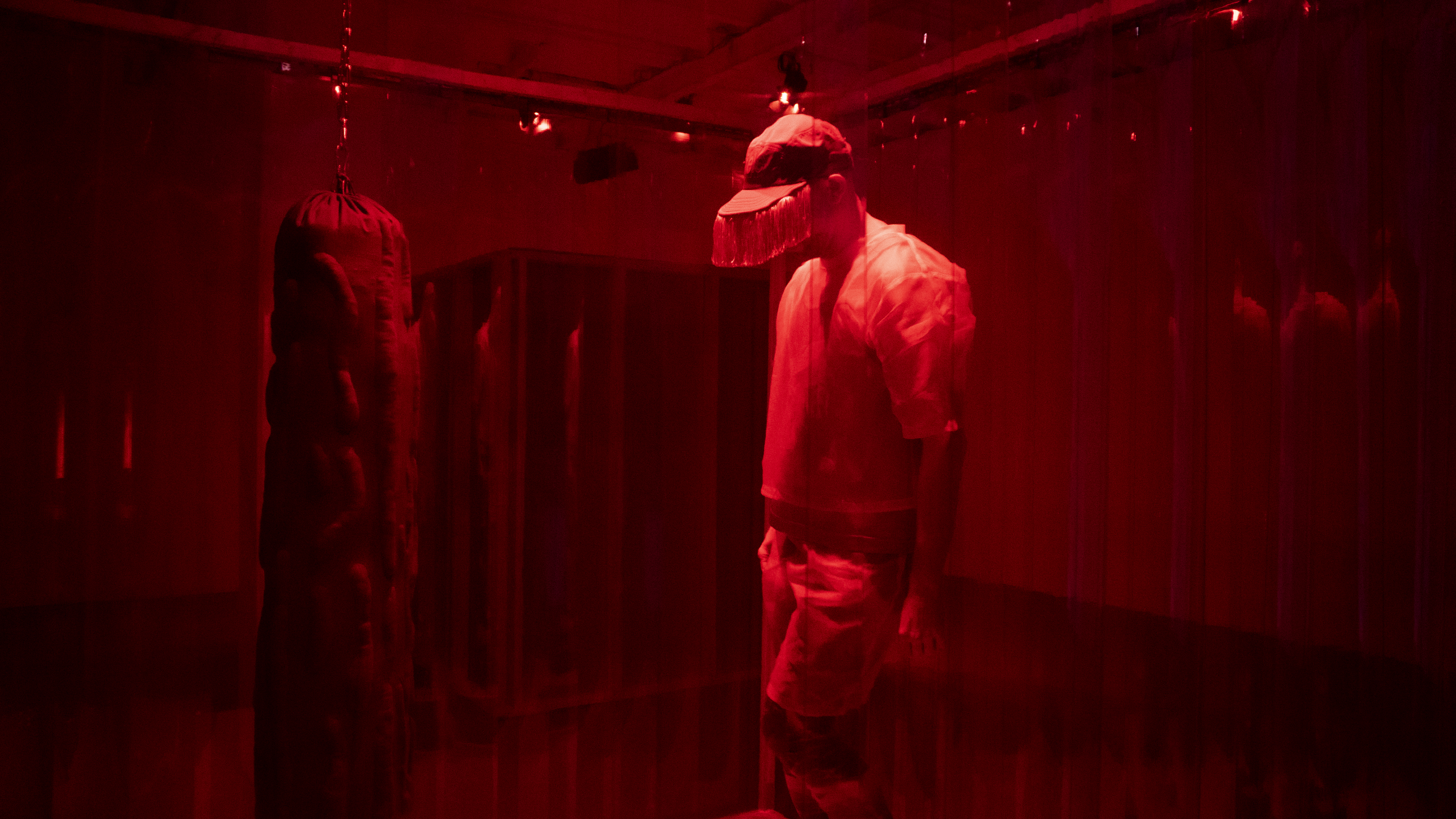
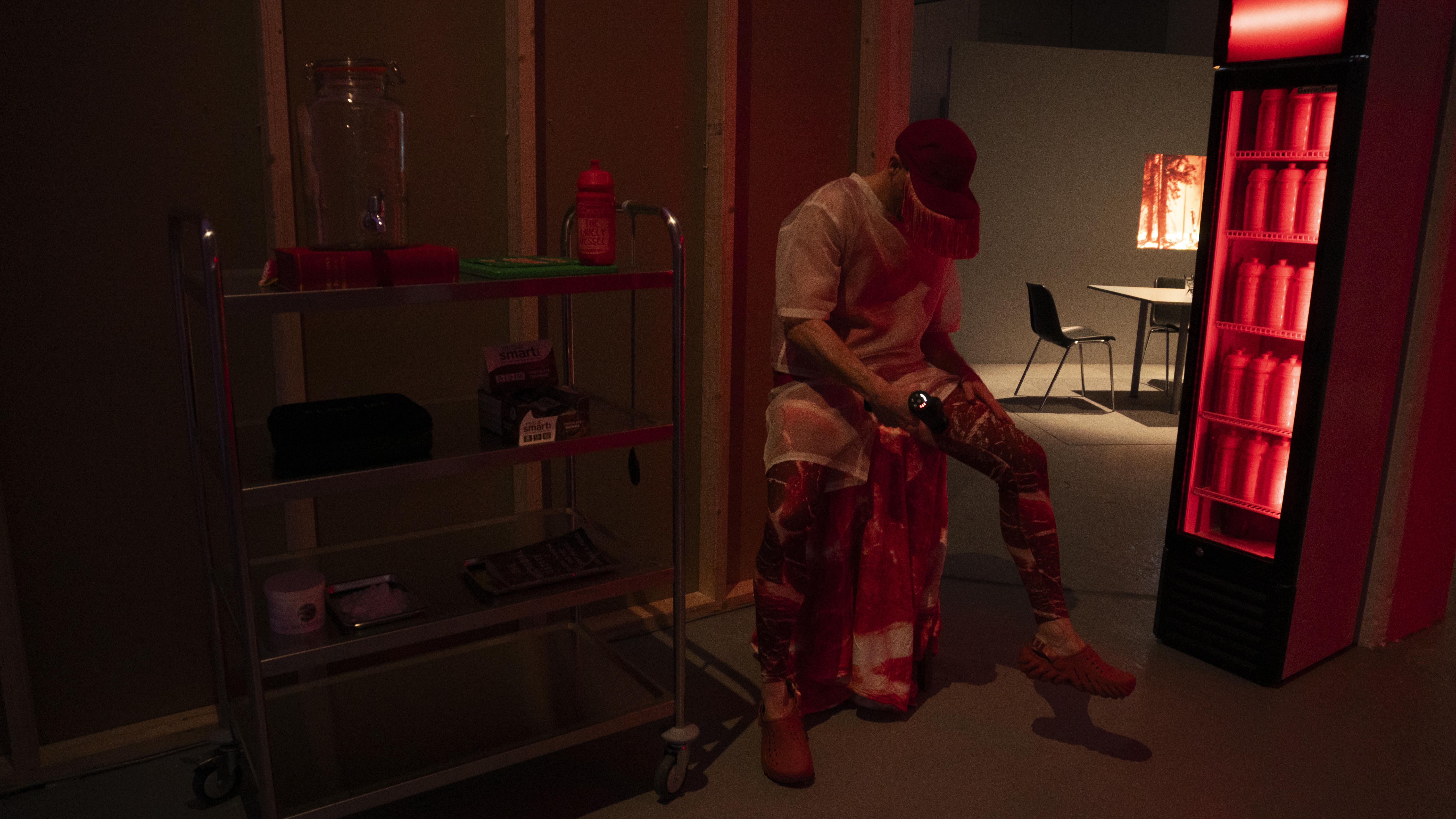
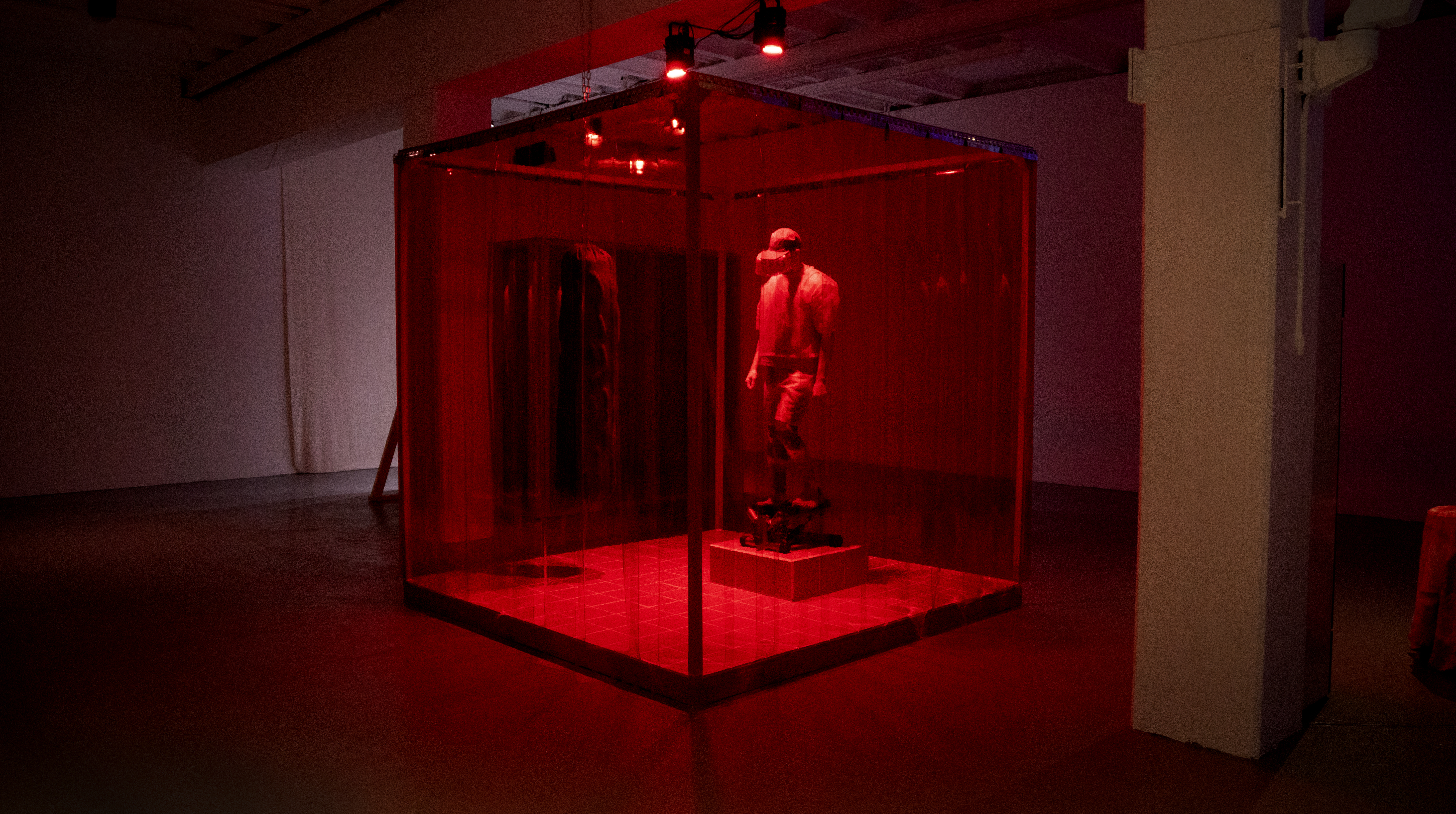
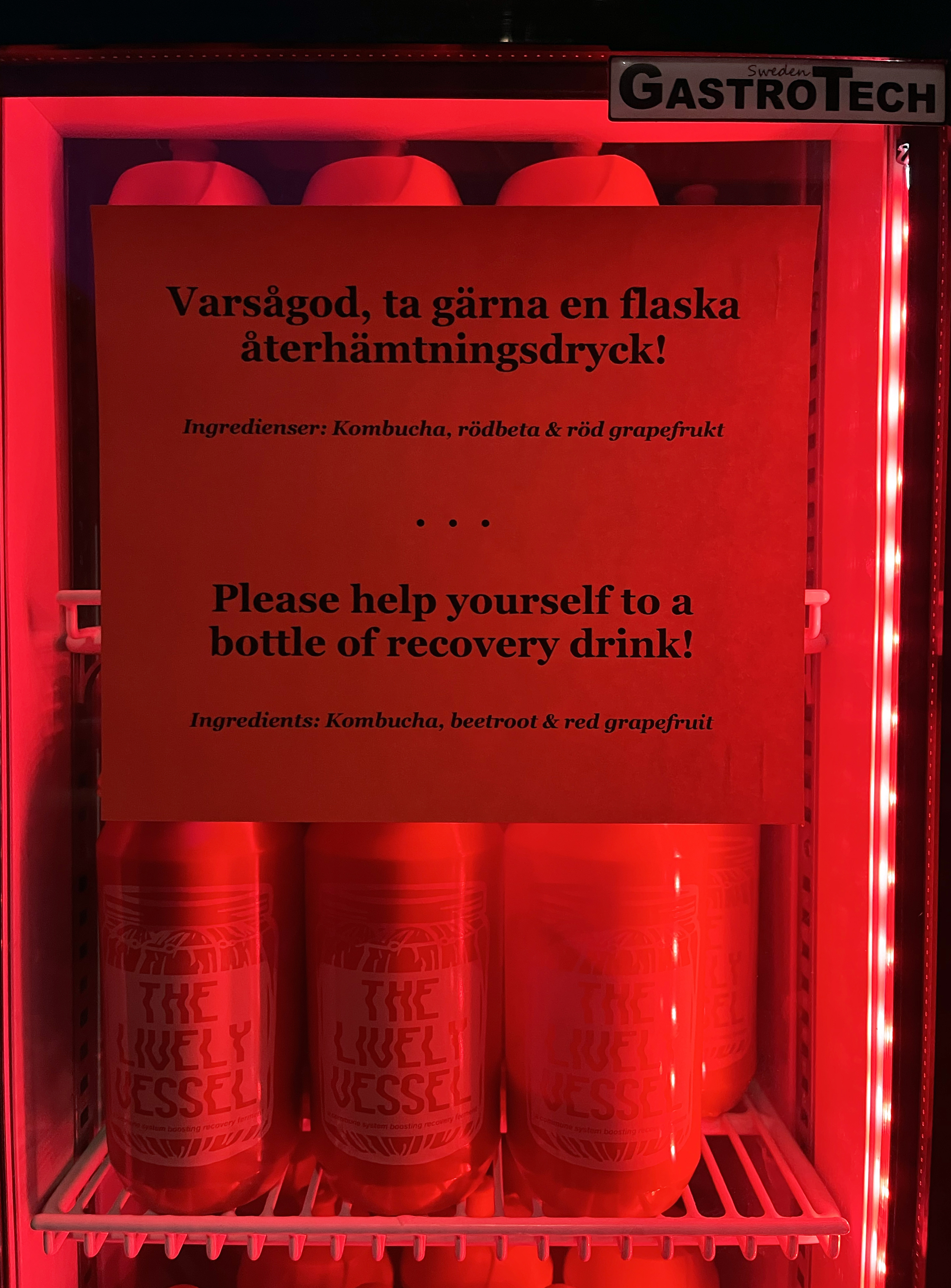
Research in microbiology is problematizing the traditional idea of the body as clearly defined and is complicating what it means to be human. This is because we are primarily made up of beneficial and pathogenic bacteria. In terms of our bodily composition, non-human DNA outnumbers human DNA. The human body's largest population of microorganisms is found in the gut. It is called the gut microbiota, where trillions of microorganisms coexist and its microbiome can contain 1000 times more "non-human" genes than human. This challenges the idea of humans as sovereign beings and proposes them instead as a traveling assemblage of microorganisms, a 'lively vessel,' in constant flux through our bodily porous and leaky boundaries with our bacterial environment.
In the space at Lilith Performance Studio, there is a fridge where the recovery drink 'The Lively Vessel' is served from red sports bottles. The drink consists of kombucha, beetroot juice, and red grapefruit juice and thus contains millions of lively lactic acid bacteria. Through the constant production of lactic acid, the drink and the body in the room are in an ongoing, simultaneous fermentation process. As a visitor, you are welcome to have a sports bottle and allow yourself to be recuperated by embodying the lively vessel and welcoming microbial coexistence. In Corpus Politicum: A Lively Vessel, I ask how we can metaphorically look at fermentation in general and lactic acid in particular wrapped up in this state-body relationship?
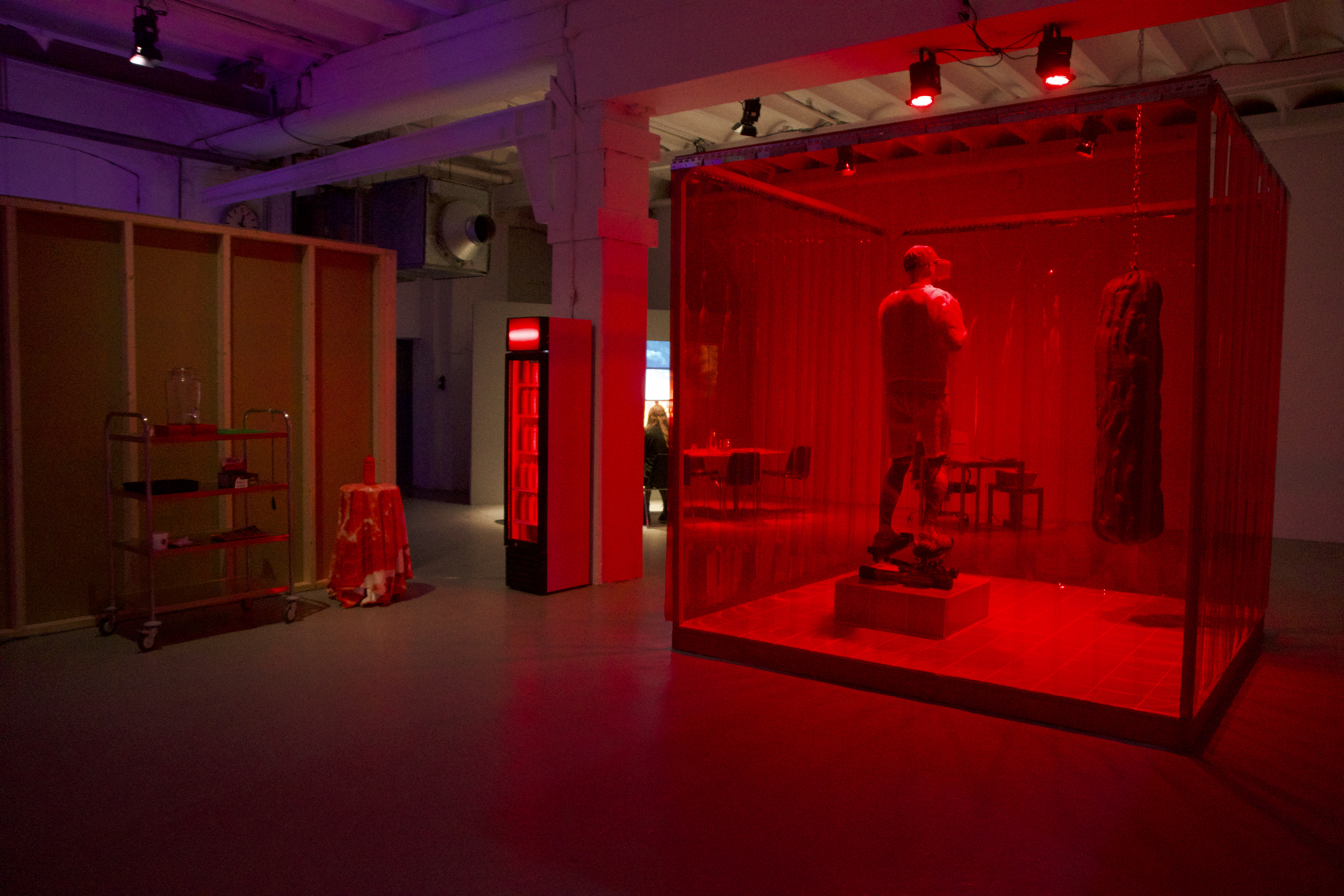
A Sour Place:
Embodied Metabolisms &
Fermented Narratives
Performed at SKOGEN, 2024A Sour Place: Embodied Metabolisms and Fermented Narratives is a performative investigation of lactic acid production across different worlds. The work is presented as a durational performance installation in collaboration with DJ and artist Jamie Hudson, who is composing and remixing live soundscapes for the piece's duration. Lactobacillus Acidophilus are acid-loving milk bacteria and instrumental in the lacto-fermentation of food and beverages; they also play a pivotal role in several beneficial microbial processes in the body. When you work your muscles hard and fast, a type of anaerobic respiration is carried out by the L. Acidophilus bacteria and your own muscle cells. That an identical chemical process can occur in these different contexts, in our muscles, and in a pickle jar(!), opens up thoughts about bio-political aspects of non-anthropocentric relations between human and more-than-human spaces.
DJ: Jamie Hudson / Recovery Drink: Kristin Bergman & Andreas Engman / Costume: Annie Johansson / Installation: Annie Johansson & Andreas Engman / Light Design: Fabian Roos & Andreas Engman / Performance: Andreas Engman / Photography: Hendrik Zeitler
Duration: 3 hours
(Listen to the DJ set from day 1 HERE!)

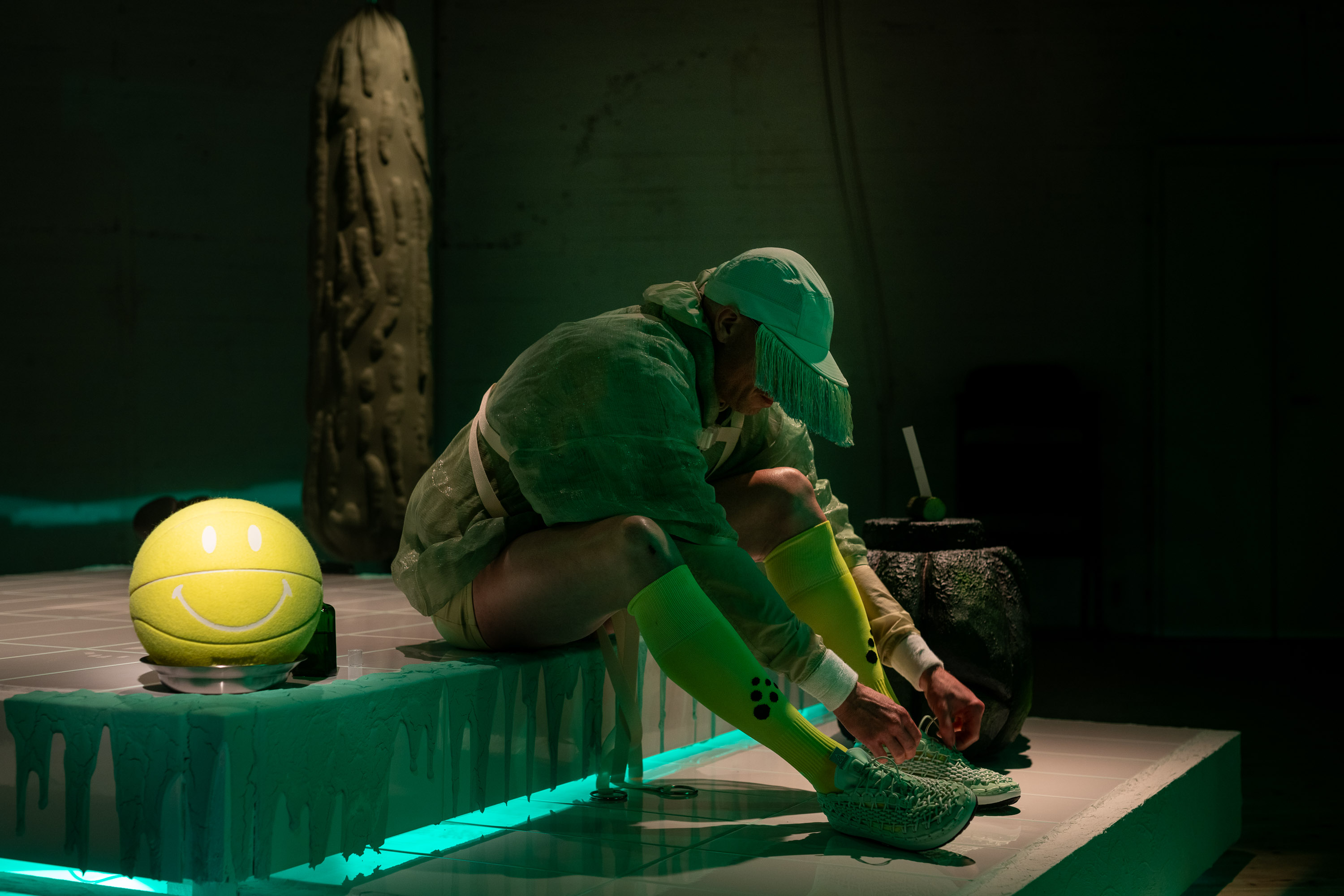

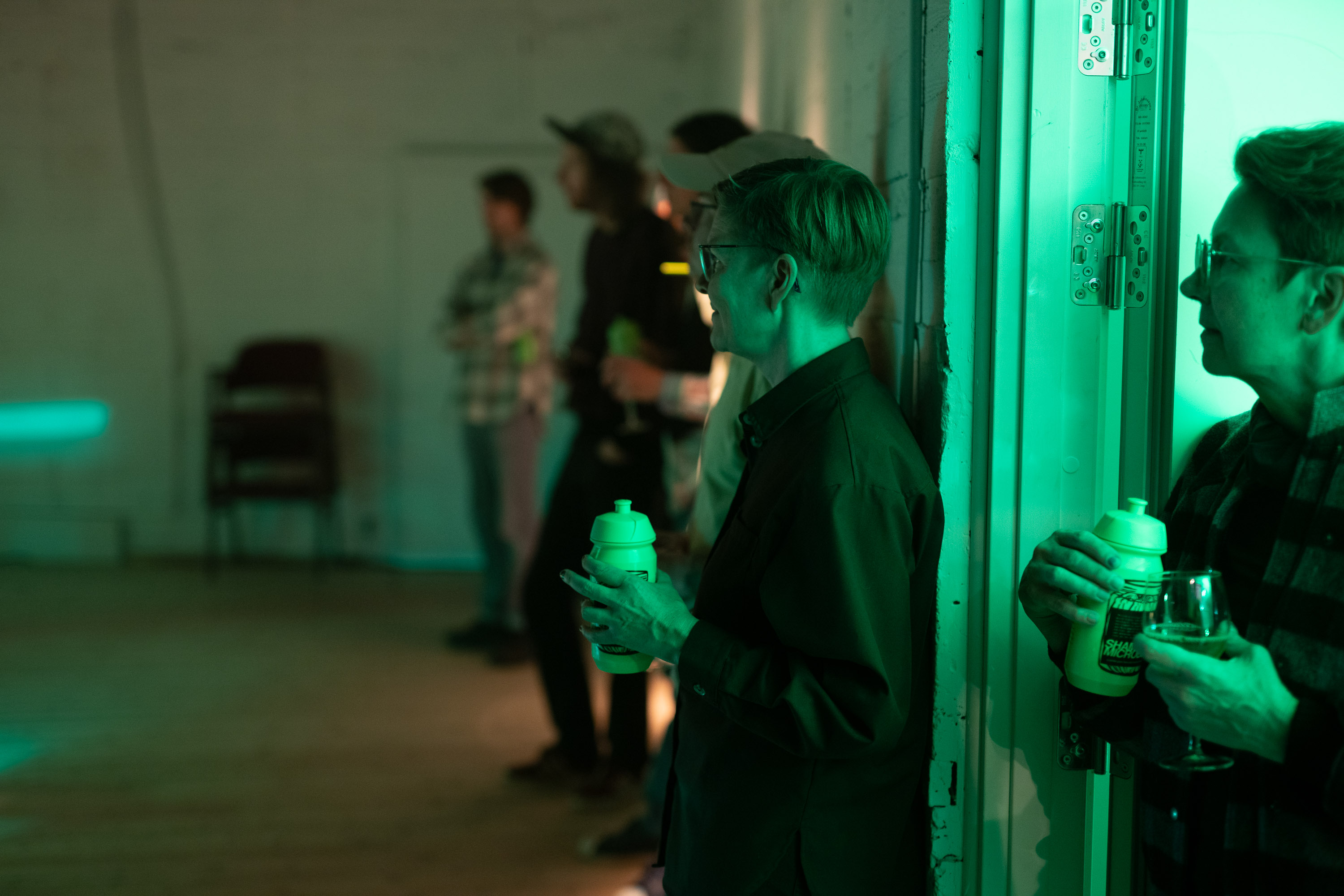
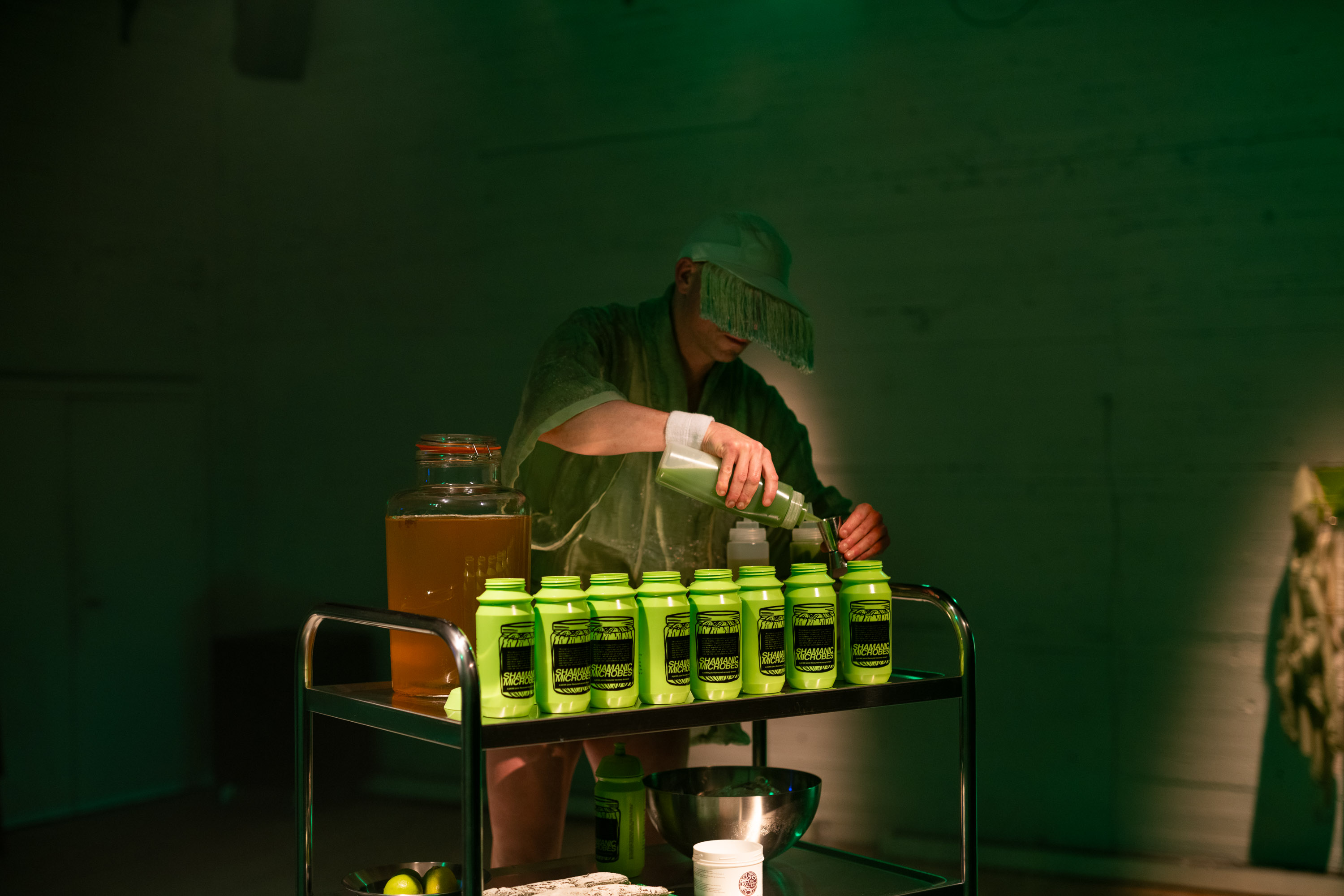

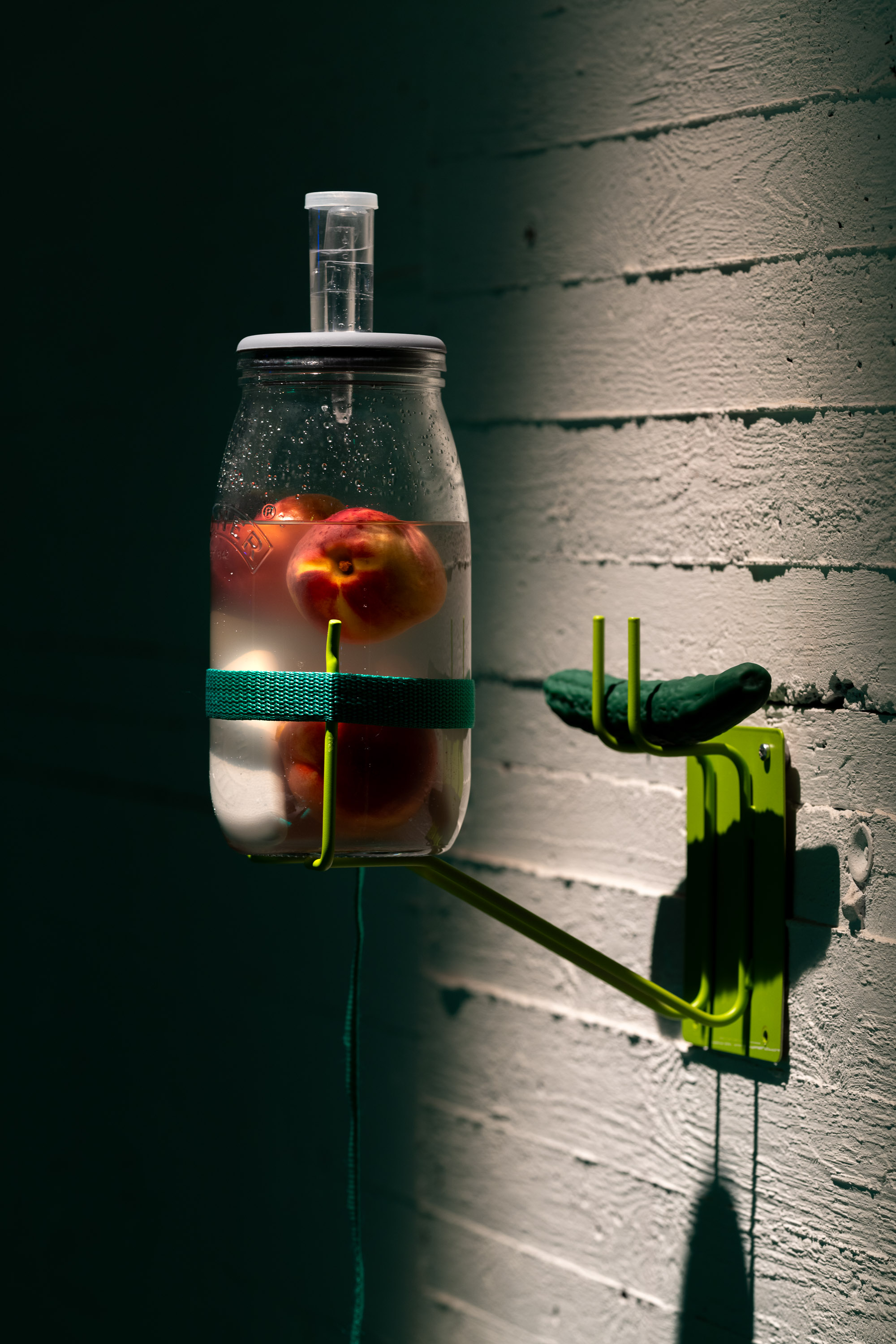
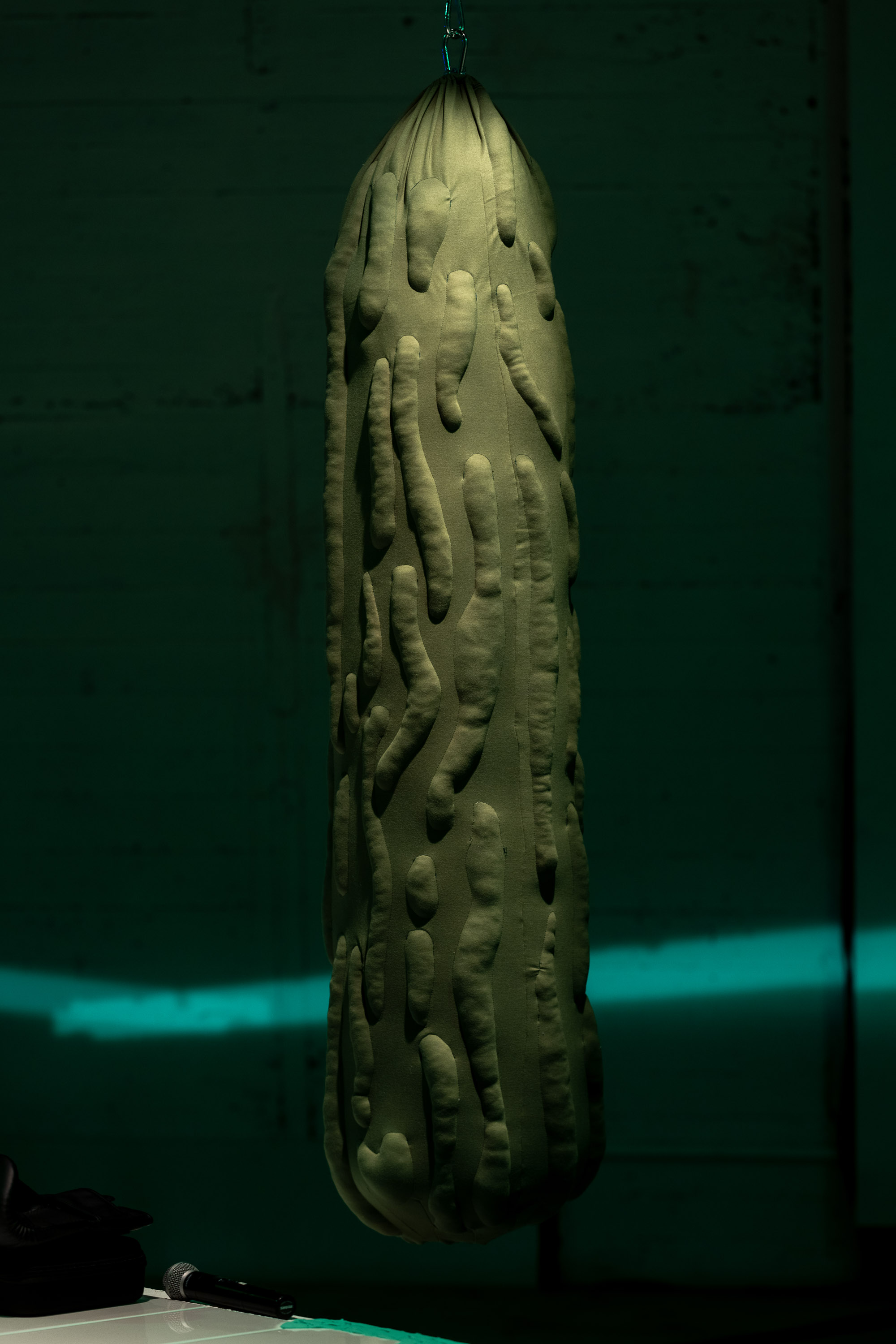
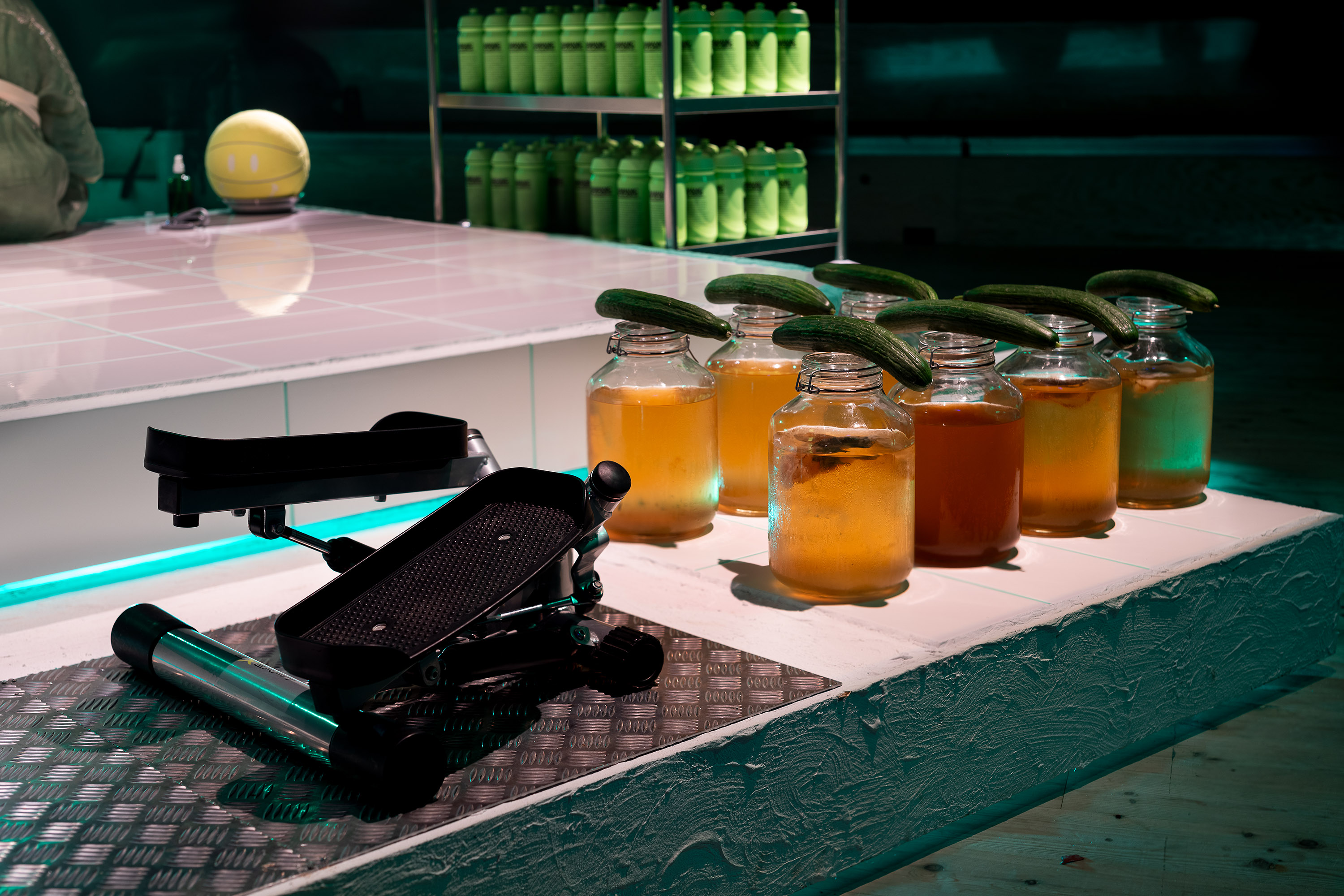

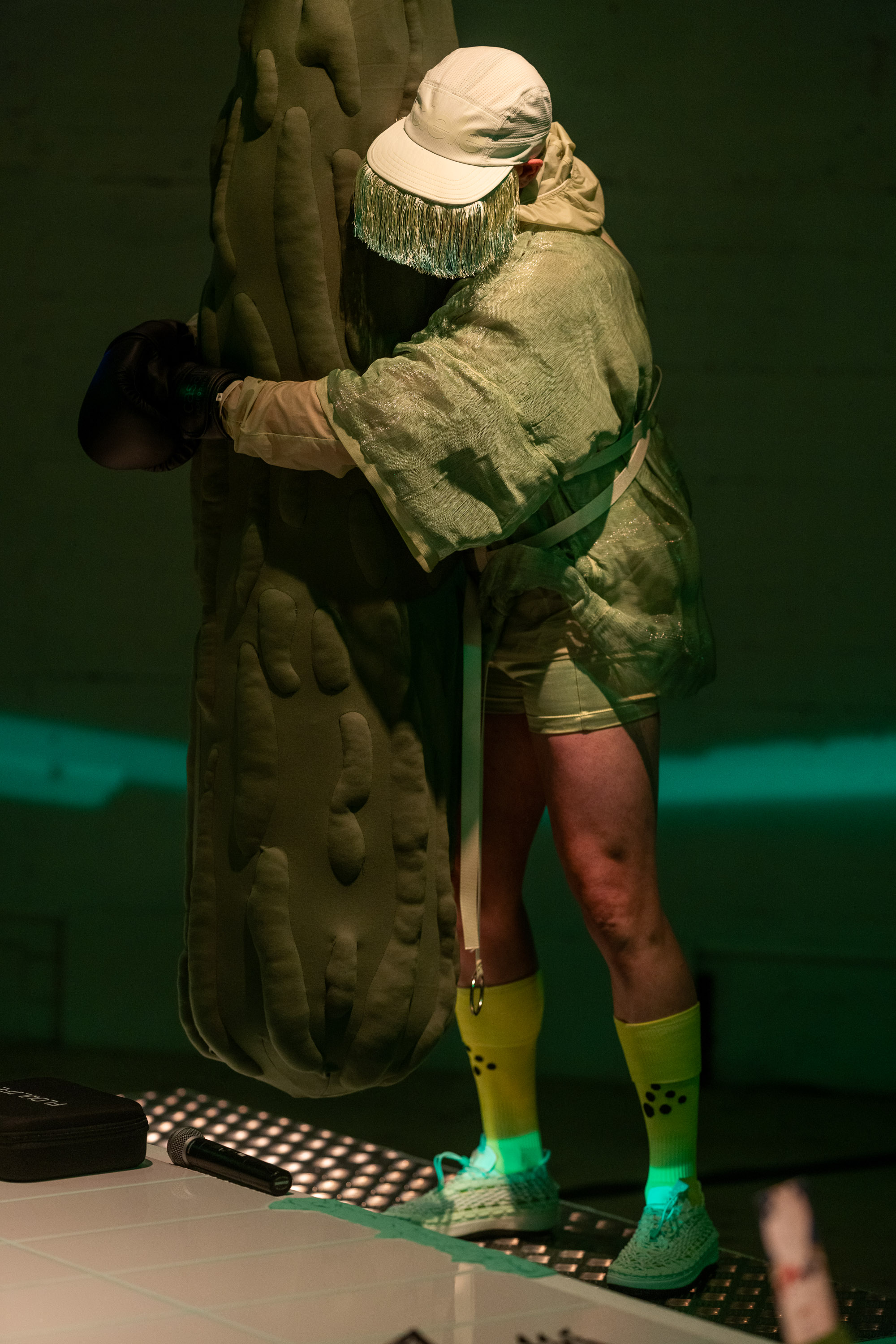



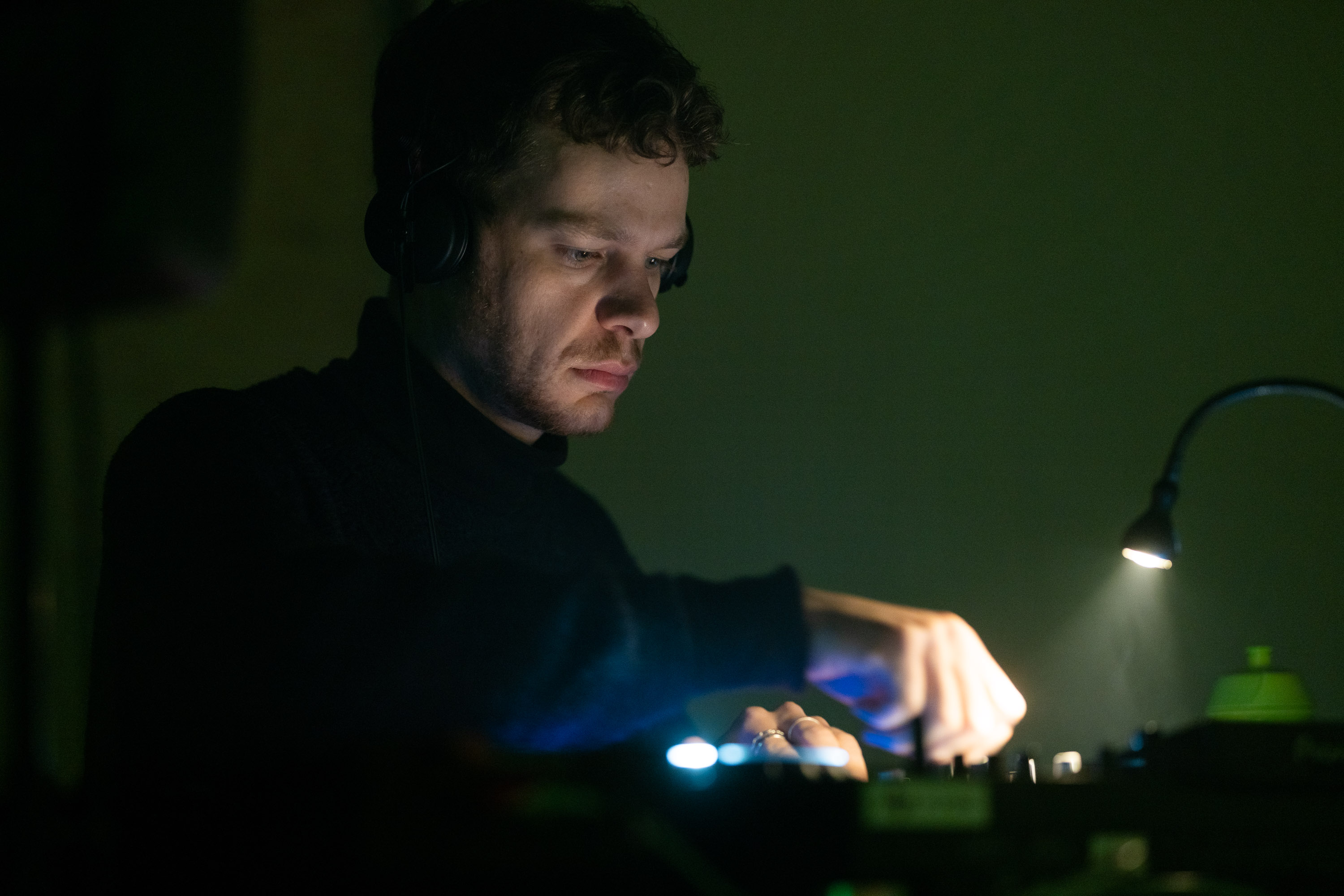

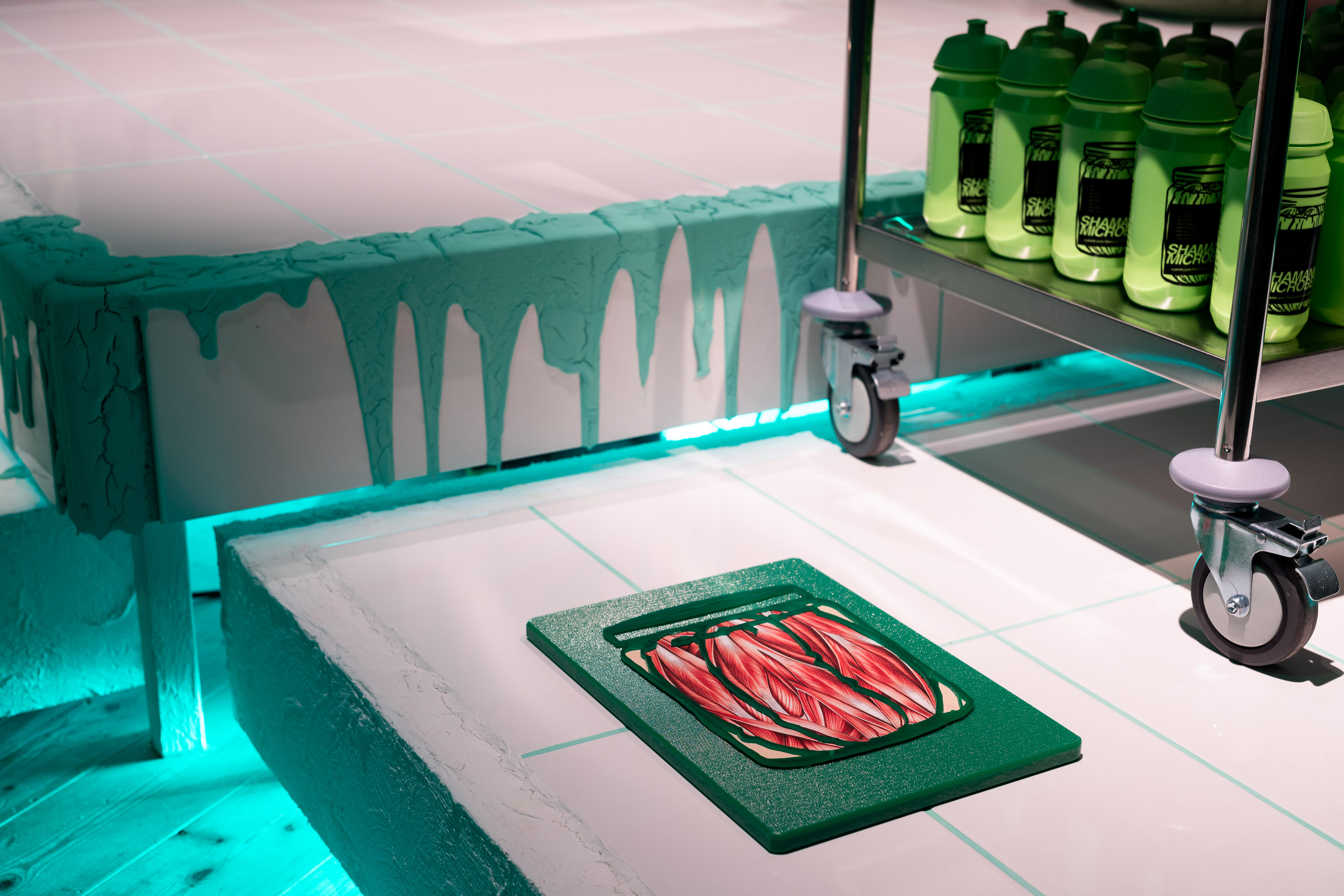


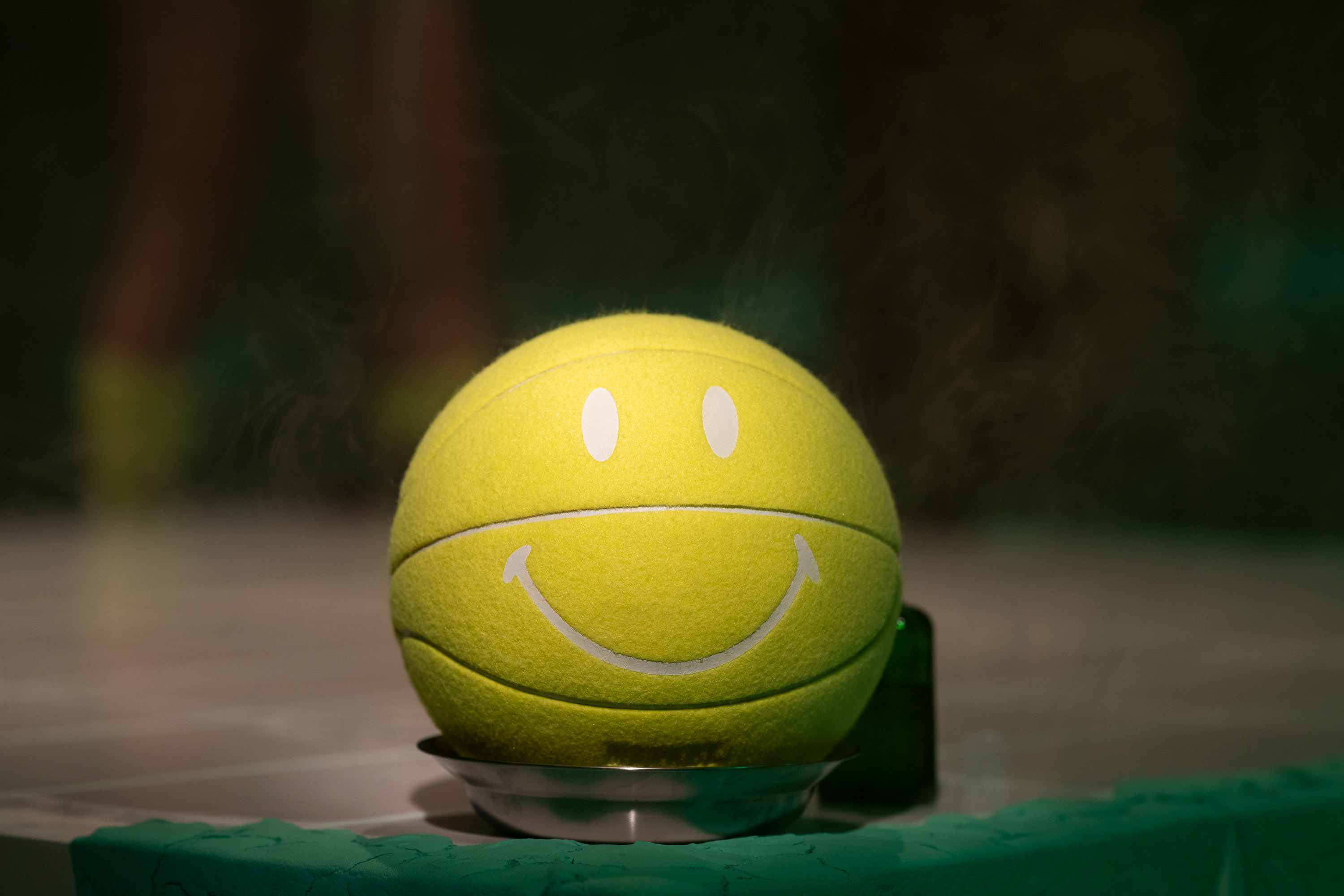
The installation incorporates the following works:
The Cucuscle, 2024
Styrofoam, cucumber, postcard with illustration by Utagawa Kunisada (1786-1864)
The Harness and The Leaky Vessel, 2024
Jacket made out of handwoven fabric (metal thread and mercerized cotton), harness
Musclecumbers, 2024
Cutting board, acrylic glass and collage
You Are What You Eat, 2024
High protein, low fat bar
Accelerationist Vaginal Flora, 2024
Fermentation jar, lacto-fermented peaches and 10 speed vibrating veggie
Shamanic Microbes, 2024
pickle juice flavored recovery ferment
Well, We're In a Real Pickle Now You and Me, 2024
Punching bag, metal chain, textile